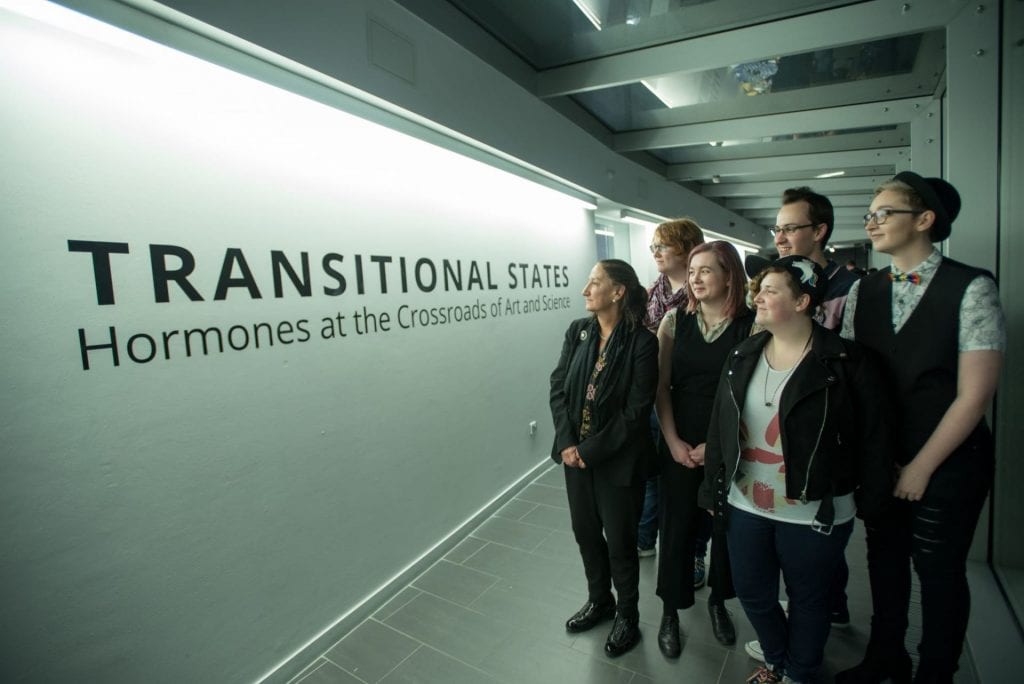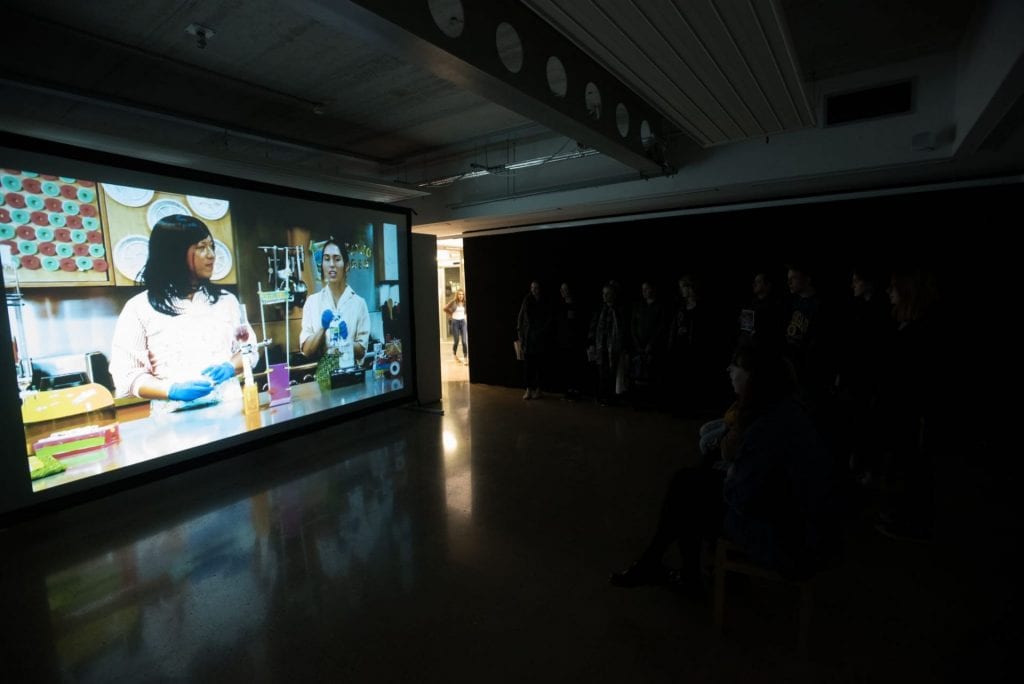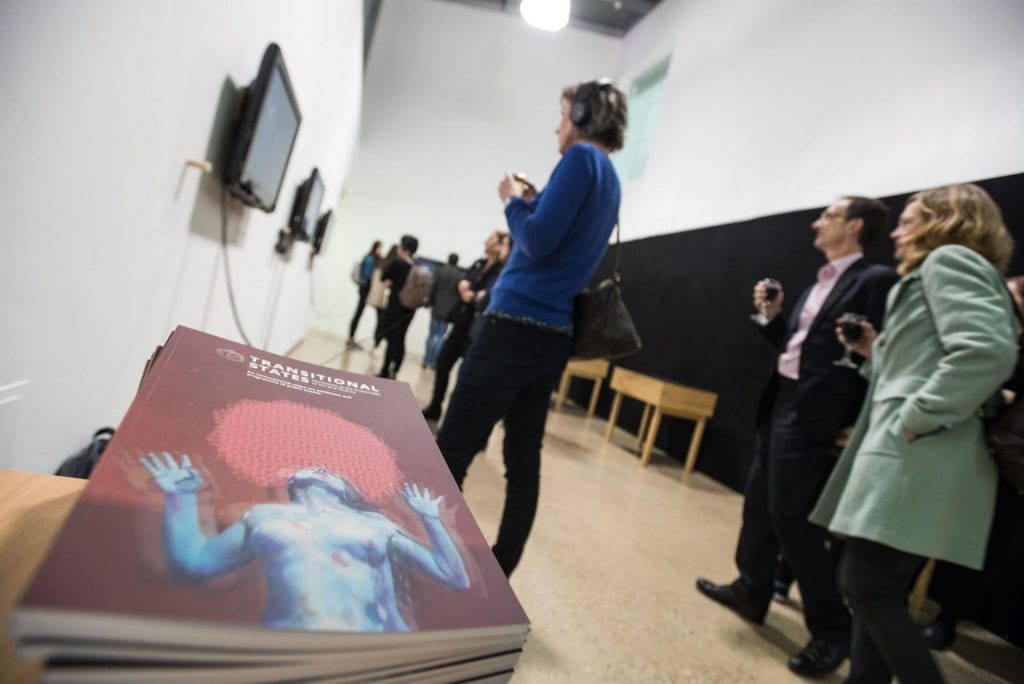by Chloe Unsworth, former undergraduate History student
Transitional States: Hormones at the Crossroads of Art and Science was created and run by Dr Chiara Beccalossi, currently a Reader of History at the University of Lincoln. Transitional States is part of Beccalossi’s five-year project, supported by the Wellcome Trust, called “Sexology, Hormones and Medical Experiments in the Latin American World: Local Power and International Networks 1918-1985”.
The Transitional States exhibition was hosted in four cities, in three countries, (Lincoln, UK; London, UK; Barcelona, Spain; Bologna, Italy). The project was composed of a video exhibition with 14 videos exploring themes such as gender and gender identity, sexuality, age, and fertility through the use, role, and consumption of hormones on the human body. The videos were created by national and international artists, including: Fox and Owl, Marianna Simnett, Holly Slingsby and Zaya Barroso. At each location where Transitional States was hosted, there was also a series of public talks, including: ‘Sex, Science and the Body: Medicine and LGBTIQ People’; ‘Trans Perspectives: A Public Discussion on Gender, Art and Politics’, and ‘Are Hormones a Question of Choice? Feminist, Transgender and Intersex Perspectives’. In addition to the public discussions, Transitional States included a three-day conference at Barcelona in October 2018, which was co-organised with interdisciplinary project Rethinking Sexology (University of Exeter).

Before working on this project, I had only ever worked with an academic whilst as a student, as opposed to two colleagues working together. The transition of working as student-teacher to two colleagues was straightfoward. It meant I had to take a lead with the work that I was given and take the initiative when required. However, these were skills that I had developed while at university, especially when researching and writing my dissertation.

For the Transitional States project, I was the Public Engagement Officer. In this role I promoted Transitional States on Facebook and Twitter by creating and posting content for social media, and answering public enquires to the project. In addition to running the social media for the project, I promoted and attended workshops with external speakers. For example, in September 2017 Jason Barker from Gendered Intelligence, a Community Interest Company, delivered an interactive workshop for students at the University of Lincoln. This workshop focused on how objects are able to convey ideas of identity and selfhood. It also encouraged those who attended the workshop to become active bystanders, by intervening, when they witnessed discrimination, as opposed to remaining passive. Similarly, in November 2017, there was a workshop led by Diana Georgiou from Arts Feminism Queer, who was also one of the curators of the Transitional States exhibition. This workshop explored the presentation of objects in exhibitions and how best to present objects to ensure that they have an impact on audiences. In addition, I led workshops for students at the University of Lincoln where we explored what objects could be used to present one’s gender and gender identity, and these were later included in the Transitional States exhibitions in Lincoln and London.

Whilst working on the Transitional States project as the Public Engagement Officer, I was able to use and develop the skills that I had learnt during my undergraduate degree. For example, during my degree I learnt how to research and organise large collections of data, and I was able to transfer this skill when I was working on Transitional States when researching and collating data from over 500 organisations in to meaningful documents. I was also able to learn new skills whilst working on the Transitional States project. Prior to becoming the Public Engagement Officer, I had only used social media for personal use – never for business purposes or on campaigns for projects. As a result of this project, and the opportunities that came with it, I was able to develop my knowledge of how to effectively use social media for purposes outside of personal use, becoming aware of how to reach wider audiences by using search-engine optimisation (SEO) and how to effectively craft messages for social media by utilising in-built tools, such as hashtags and pictures.

While working on the Transitional States project, attending the official openings of the Transitional States exhibition in Lincoln, London and Barcelona, as well as hosting some of the public discussions, I was fortunate to be provided with many opportunities to network with individuals from a wide range of backgrounds: this included people working in academia, curators of exhibitions, activists, and others who work in film and media. These opportunities have provided me with the chance to meet a wide range of people with disciplines in many backgrounds. For me, this was very useful as it has allowed me to gain an insight into different lines of professional work, and also understanding the wide range of options and possibilities of where a university degree could take me, both in the short term and longer term.